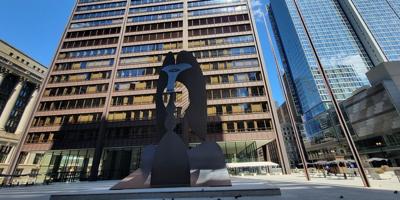
Richard J. Daley Center, Chicago
CHICAGO - The maker of once-popular heartburn medication Zantac has secured yet another win in court against claims the active ingredient in that medication increased cancer risk in those who took the drug.
On Aug. 27, a jury in Cook County Circuit Court rendered a verdict in favor of pharmaceutical company Boehringer Ingelheim.
The new verdict closed out a trial in a case brought against the drugmaker by plaintiff Jeffrey Halter and his legal team from the law firm of Keller Postman, of Chicago. According to court documents, Halter claimed his use of Zantac caused him to develop colorectal cancer.
According to a release from Boehringer Ingelheim's attorneys at the law firm of King & Spalding, the jury returned its verdict in just three and a half hours after a trial that lasted 10 days.
Boehringer Ingelheim was represented at trial by King & Spalding attorneys Cory Hohnbaum, Antonio Lewis and Corinne Nabors.
King & Spalding said the verdict marked the eighth time a jury has declined to find Boehringer Ingelheim liable in cases seeking to make the company pay for allegedly causing cancer in people who took over-the-counter Zantac.
Some of those eight cases have resulted in verdicts in favor of Boehringer Ingelheim, while other trials have resulted in hung juries.
Trials have consistently resulted in failures by plaintiffs' lawyers since the first case went to trial in Cook County Circuit Court in May 2024, as juries have consistently rejected what has been called anti-scientific claims of a link between ranitidine, the active ingredient formerly used in Zantac for most of its commercial existence, and cancer.
Plaintiffs in the case have claimed the makers and sellers of Zantac, including pharmaceutical companies GlaxoSmithKline and Boehringer Ingelheim, owe them hundreds of millions of dollars each.
In Cook County and elsewhere in the U.S., thousands of lawsuits have been lodged against the drugmakers over claims of a causal link between ranitidine and colorectal, prostate, bladder and kidney cancers.
Attorneys for the drug companies have consistently told jurors the cancer causation claims presented by the plaintiffs cannot be supported by scientific evidence.
Zantac and its generic equivalents containing ranitidine were sold for decades in the U.S., as the drug became one of the most popular anti-heartburn medications available.
However, in 2020, the Food and Drug Administration recalled ranitidine, allegedly over its potential link to cancer.
A heartburn medication is still sold under the Zantac brand name, but it now contains a diferent active ingredient.
The recall was based on testing conducted by an organization known as Valisure LLC.
In recent years, a report produced by Valisure in 2019 spawned both headlines and tens of thousands of lawsuits nationwide, when it claimed its testing showed the heartburn medicine contained an ingredient that changed to a compound known as NDMA, a known carcinogen.
In court filings, plaintiffs' lawyers have repeatedly cited Valisure's report in their filings, calling Valisue an "independent" lab.
However, the FDA and the federal judge have since found fault with Valisure's methods. To cause ranitidine to break down into NDMA, for instance, the tests reportedly required subjecting the medication to temperatures as high as 260 degrees and lethal levels of salt in a so-called "artificial stomach."
According to court documents, Valisure detected no NDMA in ranitidine when testing it under normal human conditions.
The FDA declared Valisure's testing methods were unreliable, and a Florida federal judge in 2022 dismissed about 50,000 lawsuits after finding Valisure's methods didn't fit expert witness standards.
Judges in Delaware and California disagreed with those conclusions, allowing lawsuits there to proceed. However, in July, the Delaware Supreme Court sided with the companies, ruling that a trial judge in that state improperly admitted evidence and expert testimony that defendants have called "junk science."
That ruling came after GSK also settled some Zantac cancer causation claims in Connecticut.
In May 2024, drugmaker Pfizer also agreed to pay $250 million to settle more than 10,000 lawsuits lodged over ranitidine claims.
In the meantime, however, Boehringer Ingelheim, in particular, has continued to contest the lawsuits in court, winning repeatedly at trial.
The string of plaintiffs' losses, coupled with the Delaware evidentiary ruling, appear to have also led plaintiffs' firms to begin refusing to take on any more Zantac cancer causation cases.
The law firms of Keller Postman, in Chicago, and Miller & Zois, of Baltimore, Maryland, both of whom have filed Zantac-related lawsuits, for instance, have both stated on their sites that they are not accepting any more such cases.




